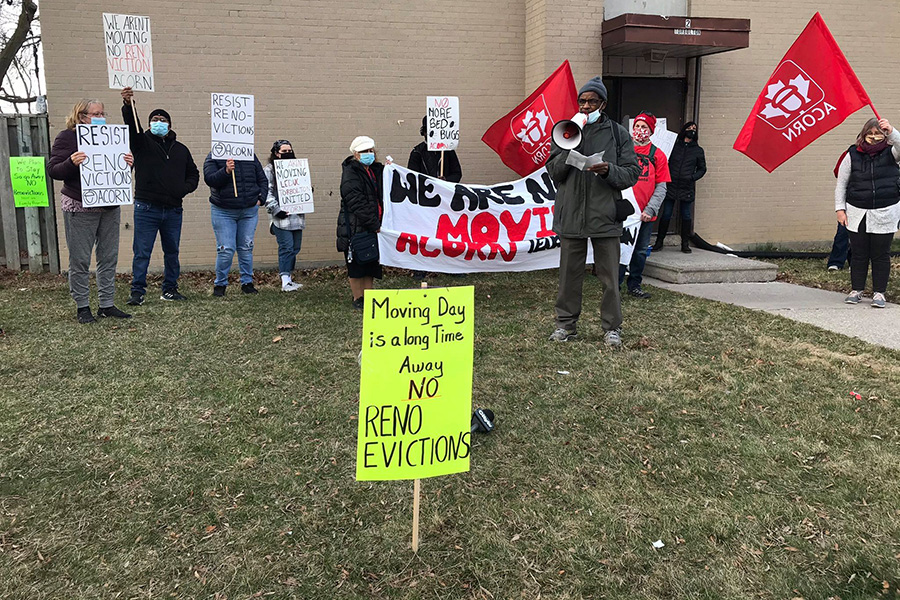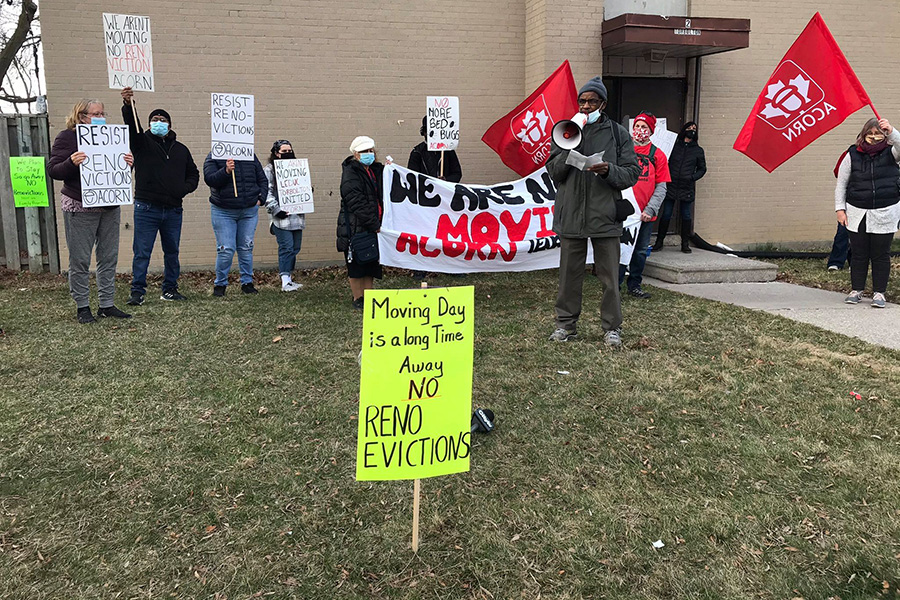NOW Magazine: Op-Ed: Advice to tenants facing renoviction – stay put
Posted January 12, 2022
Posted January 12, 2022
 Family Properties is the owner of a large number of rental properties in the GTA, including six apartment buildings in Toronto.
Family Properties is the owner of a large number of rental properties in the GTA, including six apartment buildings in Toronto.
Shortly after the company purchased a building at 25 Leduc and a townhouse at 2 Torbolton in November 2020, it issued notices of termination to tenants for extensive renovations at both properties. Tenants were given a blank notice of termination to sign and offered a buyout of $5,000 to vacate their units by March 31, 2021. But a small number of tenants have decided to fight the evictions.
Family Properties has started renovating the vacant rental units and is currently listing the newly renovated ones for $2,700 per month, which is significantly more than the $1,190 and $900 per month that tenants at Leduc and Torbolton were paying.
Toronto ACORN (Association of Community Organizations for Reform Now) has been door-knocking and speaking with tenants in low-to moderate-income neighbourhoods about similar efforts by landlords to renovate occupied units. In some cases, tenants have been offered buyout packages as low as $1,500, which barely covers moving costs and do little to help with the increased rent tenants they will be forced to pay in Toronto’s private market.
In British Columbia, the City of New Westminster has amended its Business Regulations and Licensing (Rental Units) Bylaw in order to curb such “renovictions.”
The amendments require landlords to make arrangements for the accommodation of tenants during and after the renovation and prior to issuing a notice of termination. Landlords that fail to do so face a severe financial penalty, and can potentially lose their licence. Since the passage of these amendments in 2019, there have been zero renovictions in New Westminster.
Toronto needs to take similar initiative and make better use of tools it already has at its disposal through the Apartment Buildings Bylaw, the RentSafeTO program and the building permitting process.
For example, the city can put knowledge and power into the hands of tenants by requiring the distribution of information about eviction prevention alongside eviction notices.
Furthermore, the city could add extra requirements to the building permit application or approval process. The city can also create a public register of tenant buyouts, building permits and home sales.
These are not onerous burdens on good-faith landlords. Rather, they are mechanisms that prevent landlords from abusing the current system.
The city also needs to exercise its ability to impose major financial penalties. The question is, how soon will the city take these steps? Tenants can’t afford to wait. Affordable housing is under attack.
A recent report by the Advocacy Centre for Tenants Ontario revealed a staggering 294 per cent increase in landlord applications to evict tenants at the Landlord and Tenant Board (LTB) since 2015-2016, to convert, demolish or extensively renovate the rental unit or residential complex.
These no-fault evictions not only force tenants out of their homes, but exacerbate the city’s housing crisis by destroying what little is left of affordable housing stock. A major reason this is the absence of vacancy control at the provincial level to limit rent gouging by landlords.
When a rental unit becomes vacant, a landlord may increase the rent to market value, while provincial rent control laws limit the percentage a landlord can increase a tenant’s rent from year-to-year. The end result is a financial incentive for landlords to evict long-term tenants to maximize their profits.
Provincial law requires landlords to compensate tenants with up to three months’ rent. It also provides tenants with an opportunity to exercise the right to return to the rental unit after the renovations are complete and pay the same rent.
Unfortunately, many tenants are unaware of their landlord’s legal obligations and their own rights, including their right to contest the notice of termination at the LTB. Many landlords do not need to provide proof of having building permits for renovations before issuing a notice of termination. Many tenants simply move out.
***
Bhavin Bilimoria and Karly Wilson are with Don Valley Community Legal Services. Patricia Edwards is a member of Toronto ACORN.
***
Op-Ed by Bhavin Bilimoria, Karly Wilson, and Patricia Edwards for NOW Magazine

